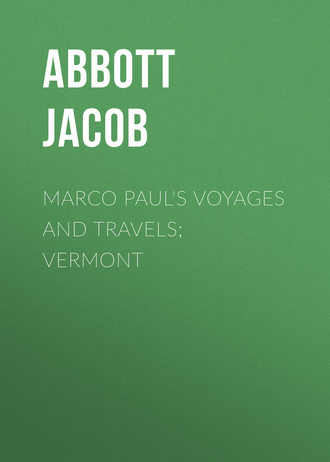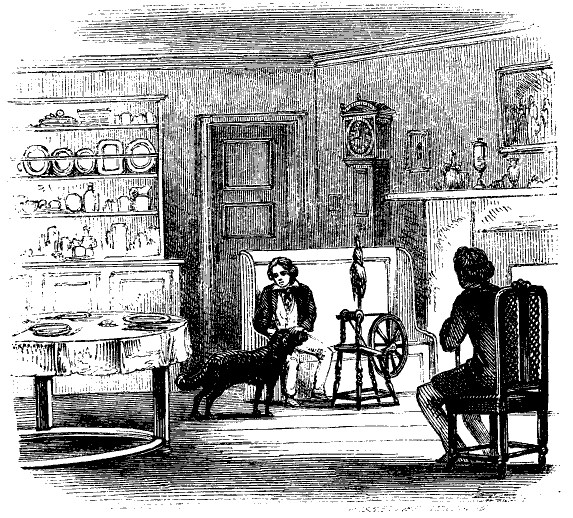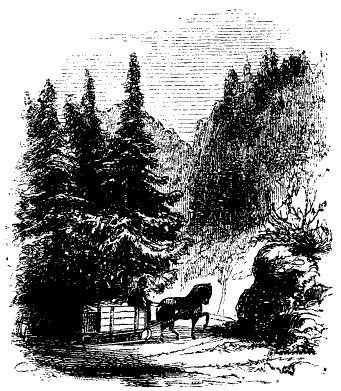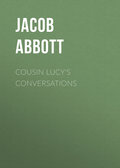
Abbott Jacob
Marco Paul's Voyages and Travels; Vermont
Forester and another gentleman then urgently asked where he was, and the driver told them that he was "back there a piece," as he expressed it.
"What! lying in the road?" said Forester; "open the door, and let us go and see to him."
"No," said the driver; "he has got off to the side of the road, safe. I don't believe he's hurt any. Let him take care of himself, and we'll drive on."
But Forester remonstrated strongly against leaving the poor sailor in such a condition, and in such a place; and finally it was agreed that the farmer should go down the road and see to him, so as to allow the stage-coach with the passengers to go on.
Forester was not willing, however, to have Marco ride outside any longer; and so they contrived to make room for him within. As Marco descended from his high seat, the driver said to him, as he passed him, in a low voice,
"How did you get the reins? I thought they all came down with me, under the horses' heels."
"Yes," said Marco, "they did, and I climbed down upon the pole and got them."
"Well," said the driver, "you're a smart boy. But don't tell them inside that I tumbled off. Tell them I gave you the reins, and jumped down to see the sailor."
After receiving this charge, Marco would have been under a strong temptation to tell a falsehood, if the company in the coach had asked him any questions about it. But they did not. They were so much occupied in expressing their astonishment that the sailor did not break his neck, that they asked very few questions, and after riding a short time, they relapsed into silence again. The fact that both the driver and the sailor escaped being seriously hurt, was not so wonderful as it might seem. Horses have generally an instinctive caution about not stepping upon any thing under their feet. If a little child were lying asleep in the middle of a road, and a horse were to come galloping along without any rider, the mother, who should see the sight from the window of the house, would doubtless be exceedingly terrified; but in all probability the horse would pass the child without doing it any injury. He would leap over it, or go around it, as he would if it were a stone. This is one reason why, in so many cases, persons are run over without being hurt. The driver and the sailor, however, fell rather behind the horses' heels, and escaped them in that way, and they came down so exactly into the middle of the road, that they were out of the way of the track of the wheels, and thus they escaped serious injury.
The misfortunes of the evening, however, did not end here. The road was rather rough, and there were many ruts and joltings; and one or two of the passengers seemed to feel some fear lest the stage should upset. One, who sat near the door, put his arm out at the window over the door, so as to get his hand upon the handle of the catch, in order, as he said, to be ready to open the door and spring out, at a moment's warning. The gentleman on the back seat advised him not to do it.
"If you have your arm out," said he, "the coach may fall over upon it, and break it. That's the way people get hurt by the upsetting of coaches, by thrusting out their legs and arms in all directions, when they find they are going over, and thus get them broken. You ought to fold your arms and draw in your feet, and when you find that we are going over, go in an easy attitude, with all the muscles relaxed, as if your body was a bag of corn."
The passenger laughed and took his arm in; and all the other passengers, seeing that the advice of the gentleman was reasonable, concluded to follow it if they should have occasion. And they did have occasion sooner than they had expected. For, just after dark, as they were going down a long hill at a pretty rapid rate, with a wagon a short distance before them, one of the horses of the wagon stumbled and fell, which brought the wagon to a sudden stand just before the coach. The driver perceived in an instant that there was not time to stop his horses, and that the only chance was to turn out of the road and drive by. The ground at the road-side was so much inclined, that he was almost afraid to venture this expedient, but he had no time for thought. He wheeled his horses out,–just escaped the hind wheel of the wagon–ran along by the road-side a short distance, with the wheels on one side, down very near the gutter,–and then, just as he was coming back safely into the road again, the forward wheel nearest the middle of the road, struck a small stone, and threw the coach over. The top rested upon the bank, and the horses were suddenly stopped. Sometimes, on such occasions, the transom bolt, as it is called, that is, the bolt by which the forward wheels are fastened to the carriage, comes out, and the horses run off with the wheels. It did not come out in this case, however. The man who had put his arm out of the window, immediately called out, in great alarm, "Hold the horses! Hold the horses! Don't let the horses run and drag us." But this vociferation was needless. A coach full of passengers and baggage is a full load for four horses, when it is mounted on wheels. It would require an exertion far beyond their strength to drag it when on its side. The horses remained quiet, therefore, while the wagoner and the driver, who was not hurt, opened the door in the upper side of the coach. The passengers then climbed out, one by one, without injury. Mary Williams came out last, with her orange-tree safe in her hand.
Chapter III.
The Grass Country
The scene of confusion, produced by the double accident described in the last chapter, was great, but not long continued. The wagoner got his fallen horse up, and then the passengers, with the driver and wagoner, all taking hold together, soon righted the stage. None of the passengers were hurt, but the coach itself was so much injured that the driver thought it was not safe to load it heavily again. The female passengers got in, but the men walked along by the side of it, intending to travel in that way about four miles to the next tavern. Forester, however, was not inclined to take so long a walk. Fortunately, at a small distance before them, was a farmhouse which looked as if it belonged to a large and thrifty farmer. The great barns and sheds, the neat yards, the well-built walls and fences, and the large stock of cattle in the barn-yard, indicated wealth and prosperity. Forester concluded to apply here for a lodging for the night, for himself and Marco. The farmer was very willing to receive them. So the driver took off their trunks, and then the stage-coach, with the rest of the passengers, went on.
"How long shall we have to stay here?" asked Marco.
"Only till to-morrow," said Forester. "Another stage will come along to-morrow. We can stop just as well as not, as we are in no haste to get home. Besides, I should like to have you see something of the operations of a great grass farm."
Marco and Forester went into the house, and were ushered into a large room, which seemed to be both sitting-room and kitchen. A large round table was set in the middle of the floor, for supper. A monstrous dog was lying under it, with his chin resting upon his paws. There was a great settle in one corner, by the side of the fire. There were chairs also, with straight backs and seats of basket-work, a spinning-wheel, an open cupboard, and various other similar objects, which, being so different from the articles of furniture which Marco had been accustomed to see in the New York parlors, attracted his attention very strongly. Marco went and took his seat upon the settle, and the dog rose and came to him. The dog gazed into his face with an earnest look of inquiry, which plainly said, "Who are you?" while Marco patted him on the head, thereby answering as plainly, "A friend." The dog, perfectly understanding the answer, seemed satisfied, and, turning away, went back to his place again under the table.

Who Are You?
One of the farmer's young men carried the trunks into a little bed-room, which opened from the great room; and then the farmer sat down and began to enter into conversation with Forester and Marco about their accident. Forester told him also about the sailor, who had tumbled off the coach a mile or two back, and been left behind. Forester said that he should like to know whether he was hurt much. Then the farmer said that he would let him take a horse and wagon the next morning and ride back and inquire. This plan was therefore agreed upon. Marco and Forester ate a good supper with the farmer's family, and then spent the evening in talking, and telling stories about horses, and sagacious dogs, and about catching wild animals in the woods with traps. About nine o'clock the family all assembled for evening prayers. After prayers Marco and Forester went to bed in their little bed-room, where they slept soundly till morning.
In the morning they were both awakened by the crowing of the cocks, at an early hour. They also heard movements in the house and in the yard before sunrise; so they arose and dressed themselves, and after attending to their morning devotions together in their room, a duty which Forester never omitted, they went out. Marco was very much interested in the morning occupations of the farm. There was the milking of the cows, and the feeding of the various animals, and the pitching off a load of corn, which had been got in the evening before and allowed to stand on the cart, on the barn-floor, over night. The cows were then to be driven to pasture, and the boy who went with them, took a bridle to catch a horse for Forester and Marco to have for their ride. Forester and Marco went with him. It was only a short walk to the pasture bars, but they had to ramble about a little while, before they found the horses. At last they found them feeding together at the edge of a grove of trees. There were two or three horses, and several long-tailed colts. The boy caught one of the horses, which he called Nero. Nero was a white horse. Marco mounted him and rode down, with the other horses and the colts following him. They put the horse in the stable until after breakfast, and then harnessed him into the wagon. When all was ready, the farmer told them to bring the sailor along with them to his house, if they found that he was hurt so that he could not travel.
When they were seated in the wagon, and had fairly commenced their ride, Marco asked Forester, what he meant last evening by a grass farm. "You told me," said he, "that you wanted me to see a great grass farm."
"Yes," replied Forester. "The farms in this part of the United States may be called grass farms. This is the grass country."
"Isn't it all grass country?" asked Marco. "Grass grows everywhere."
"Grass is not cultivated everywhere so much as it is among the mountains, in the northern states," replied Forester. "The great articles of cultivation in the United States are grass, grain, and cotton. The grass is cultivated in the northern states, the grain in the middle states, and the cotton in the southern states. The grass is food for beasts, the grain is food for man, and the cotton is for clothing. These different kinds of cultivation are not indeed exclusive in the different districts. Some grass is raised in the middle and southern states, and some grain is raised in the northern states; but, in general, the great agricultural production of the northern states is grass, and these farms among the mountains in Vermont are grass farms.
"There is one striking difference," continued Forester, "between the grass farms of the north, and the grain farms of the middle states, or the cotton plantations of the south. The grass cultivation brings with it a vast variety of occupations and processes on the farm, making the farm a little world by itself; whereas the grain and the cotton cultivation are far more simple, and require much less judgment and skill. This is rather remarkable; for one would think that raising food for beasts would require less skill than raising food or clothes for man."
"I should have thought so," said Marco.
"The reason for the difference is," replied Forester, "that in raising food for animals, it is necessary to keep the animals to eat it, on the spot, for it will not bear transportation."
"Why not?" said Marco.
"Because it is so cheap," replied Forester.
"I don't think that is any reason," replied Marco.
"A load of grass"–said Forester.
"A load of grass!" repeated Marco, laughing.
"Yes, dried grass, that is, hay. Hay, you know, is grass dried to preserve it."
"Very well," said Marco; "go on."
"A load of grass, then, is so cheap, that the cost of hauling it fifty miles would be more than it is worth. But cotton is worth a great deal more, in proportion to its bulk. It can therefore be transported to distant places to be sold and manufactured. Thus the enormous quantity of cotton which grows every summer in the southern states, is packed in bags, very tight, and is hauled to the rivers and creeks, and there it is put into steamboats and sent to the great seaports, and at the seaports it is put into ships, which carry it to England or to the northern states, to be manufactured; and it is so valuable, that it will bring a price sufficient to pay all the persons that have been employed in raising it, or in transporting it. But the grass that grows in the northern countries can not be transported. The mills for manufacturing cotton may be in one country, and the cotton be raised in another, and then, after the cotton is gathered, it may be packed and sent thousands of miles to be manufactured. But the sheep and oxen which are to eat the hay, can not be kept in one country, while the grass which they feed upon grows in another. The animals must live, in general, on the very farm which the grass grows upon. Thus, while the cotton cultivator has nothing to do but to raise his cotton and send it to market, the grass cultivator must not only raise his grass, but he must provide for and take care of all the animals which are to eat it. This makes the agriculture of the northern states a far more complicated business, because the care of animals runs into great detail, and requires great skill, and sound judgment, and the exercise of constant discretion.
"You observe," continued Forester, "that it is by the intervention of animals that the farmer gets the product of his land into such a shape that it will bear transportation. For instance, he feeds out his hay to his sheep, attending them with care and skill all the winter. In the spring he shears off their fleeces; and now he has got something which he can send to market. He has turned his grass into wool, and thus got its value into a much more compact form. The wool will bear transportation. Perhaps he gave a whole load of hay to his sheep, to produce a single bag of wool. So the bag of wool is worth as much as the load of hay, and is very much more easily carried to market. He can put it upon his lumber-box, and drive off fifty miles with it, to market, without any difficulty."
"His lumber-box?" asked Marco. "What is that?"
"Didn't you ever see a lumber-box?" asked Forester. "It is a square box, on runners, like those of a sleigh. The farmers have them to haul their produce to market."
"Why do they call it a lumber-box?" asked Marco.

The Lumber-Box.
"Why, when the country was first settled, they used to carry lumber to market principally; that is, bundles of shingles and clapboards, which they made from timber cut in the woods. It requires some time for a new farm, made in the forests, to get into a condition to produce much grass for cattle. I suppose that it was in this way that these vehicles got the name of lumber-boxes. You will see a great many of them, in the winter season, coming down from every part of the country, toward the large towns on the rivers, filled with produce."
"What else do the farmers turn their grass into, besides wool?" asked Marco.
"Into beef," said Forester. "They raise cows and oxen. They let them eat the grass as it grows, all summer, and in the winter they feed them with what they have cut and dried and stored in the barn for them. The farmers are all ambitious to cut as much hay as they can, and to keep a large stock of cattle. Thus they turn the grass into beef, and the beef can be easily transported. In fact, it almost transports itself."
"How do you mean?" asked Marco.
"Why, the oxen and cows, when they are fat and ready for market, walk off in droves to Boston, to be killed. They don't kill them where they are raised, for then they would have to haul away the beef in wagons or sleighs, but make the animals walk to market themselves, and kill them there. But the farmers don't generally take their own cattle to market. Men go about the country, and call upon the farmers, and buy their cattle, and thus collect great droves. These men are called drovers. In traveling in this part of the country, late in the fall, you would see great droves of cattle and sheep, passing along the road, all going to Boston, or rather Brighton."
"Where is Brighton?" asked Marco.
"It is a town very near Boston, where the great cattle market is held. The Boston dealers come out to Brighton, and buy the cattle, and have them slaughtered, and the beef packed and sent away all over the world. Thus the farmers turn the grass into beef, and in that shape it can be transported and sold."
"And what else?" asked Marco.
"Why, they raise a great many horses in Vermont," replied Forester. "These horses live upon grass, eating it as it grows in the pastures and on the mountains, in the summer, and being fed upon hay in the barn in the winter. These horses, when they are four or five years old, are sent away to market to be sold. They can be transported very easily. A man will ride one, and lead four or five by his side. They will be worth perhaps seventy-five dollars apiece; so that one man will easily take along with him, three or four hundred dollars' worth of the produce of the farm, in the shape of horses; whereas the hay which had been consumed on the farm to make these horses, it would have taken forty yoke of oxen to move."
"Forty yoke!" repeated Marco.
"I don't mean to be exact," said Forester. "I mean it would take a great many. So that, by feeding his hay out to horses, the farmer gets his produce into a better state to be transported to market. The Vermont horses go all over the land. Thus you see that the farmers in the grass country have to turn the vegetable products which they raise, into animal products, before they can get them to market; and as the rearing of animals is a work which requires a great deal of attention, care, patience, and skill, the cultivators must be men of a higher class than those which are employed in raising cotton, or even than those who raise grain. The animals must be watched and guarded while they are young. There are a great many different diseases, and accidents, and injuries which they are exposed to, and it requires constant watchfulness, and considerable, intelligence, to guard against them. This makes a great difference in the character which is required in the laborers, in the different cases. A cotton plantation in the south can be cultivated by slaves. A grain farm in the middle states can be worked by hired laborers; but a northern grass farm, with all its oxen, cows, sheep, poultry, and horses, can only be successfully managed by the work of the owner."
"Is that the reason why they have slaves at the south?" asked Marco.
"It is a reason why slaves can be profitable at the south. In cultivating cotton or sugar, a vast proportion of all the work done in the year is the same. Almost the whole consists of a few simple processes, such as planting, hoeing, picking cotton, &c., and this is to be performed on smooth, even land, where set tasks can be easily assigned. But the work on a grass farm is endlessly varied. It would not be possible to divide it into set tasks. And then it is of such a nature, that it could not possibly be performed successfully by the mere labor of the hands. The mind must be employed upon it. For instance, even in getting in hay, in the summer season, the farmer has to exercise all his judgment and discretion to avoid getting it wet by the summer showers, and yet to secure it in good time, and with proper dispatch. A cotton planter may hire an overseer to see to the getting in of his cotton, and he can easily tell by the result, whether he has been faithful or not. But hay can not be got in well, without the activity, and energy, and good judgment, which can come only from the presence and immediate supervision of an owner. This produces vast differences in the nature of the business, and in the whole state of society in the two regions."
"What are the differences?" asked Marco.
"Why, in the first place," said Forester, "the fact that cotton and sugar can be cultivated by hired overseers, with slaves to do the work, enables rich men to carry on great plantations without laboring themselves. But a great grass farm could not be managed so. A man may have one thousand acres for his plantation at the south, and with a good overseer and good hands, it will all go on very well, so far as his profit is concerned. They will produce a great amount of cotton, which may be sent to market and sold, and the planter realize the money, so as to make a large profit after paying all his expenses. But if a man were to buy a thousand acres of grass land, and employ an overseer and slaves to cultivate it, every thing would go to ruin. The hay would get wet and spoiled,–the carts, wagons, and complicated tools necessary, would get broken to pieces,–the lambs would be neglected and die, and the property would soon go to destruction. Even when a rich man attempts to carry on a moderate farm by hired laborers, taking the best that he can find, he seldom succeeds."
"Does he ever succeed?" said Marco.
"Yes," replied Forester, "sometimes. There is Mr. Warner, who lives near my father's; he was brought up on a farm, and is practically acquainted with all the work. He has been very successful, and has a very large farm. He works now very little himself, but he watches every thing with the greatest care, and he succeeds very well. He has a great stock. He cuts fifty tons of hay."
"I should like to see his farm," said Marco.
"We'll go some day," replied Forester.
"So you see," continued Forester, "that the work of a cotton or sugar plantation, is comparatively simple and plain, requiring little judgment or mental exertion, and a great deal of plain straightforward bodily labor; while on a northern stock farm the labors are endlessly varied. Every month, every week, and almost every day brings some change. New emergencies are constantly arising, which call for deliberation and judgment. It is necessary to have a great variety of animals, in order to consume all the different productions of the farm to advantage. I can explain it all to you better, when you come to see Mr. Warner's farm."
As Nero traveled very fast, they began by this time to draw near to the place where they had left the sailor. When they came up to the house, they fastened the horse to a post, and went in. The man who lived there had gone away, but the woman said that the sailor was somewhat hurt, and asked them to come in and see him. They found him in the kitchen, with his foot up in a chair. He seemed to be in some pain. There was a great bruise on his ankle, made by the cork of one of the horses' shoes. These corks, as they are called, are projections, made of steel, at the heel of a horse-shoe, to give the horse a firm footing. They are made quite sharp in the winter season, when there is ice and snow upon the ground, but they are generally more blunt in the summer. This prevented the ankle's being cut as badly as it would have been, if the corks had been sharper. Forester looked at the ankle, and found that nothing had been done for it. It was inflamed and painful. He got the woman to give him a basin of warm water, and then he bathed it very carefully, which relieved the sense of tension and pain. Then he made an ointment of equal parts of tallow and oil, which he put upon the end of a bandage, and thus bound it up. This treatment relieved the poor sailor very much. Then Forester proposed to the sailor to get into the wagon and go with him to the next house, and the sailor consented. Forester was then going to pay the woman for his night's lodging, but the sailor said at once,–"No, squire, not at all. I'm much obliged to you for doing up my foot, but you need not pay any thing for me. I've got plenty of shot in the locker."
So saying, he put his hand in his pocket and drew out a handful of gold and silver pieces. But the woman, who began now to feel a little ashamed that she had not done something for the wounded foot, said he was welcome to his lodging; and so they all got into the wagon, and Nero carried them rapidly back to his master's.







